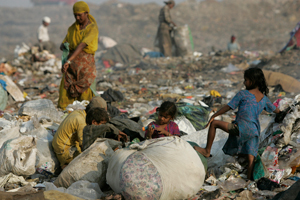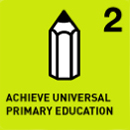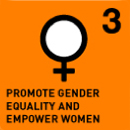
Mission
Aid for Mothers and Daughters Living in Trash Dumps
“The Unforgotten” refers to the overlooked, unemployed and undernourished mothers and their children who survive in the vast garbage dumps in cities of developing nations.
The Unforgotten – Waste pickers in Pune, IndiaMission
“The mission of The Unforgotten is to improve the lives of these women and children by providing clean food, water, and shelter as well as education and microloans to help the families achieve self-sufficiency and break the cycle of trash picking.
“The mission also is to support these women and daughters in order to free them of the burden of selling and eating scraps found in the trash, improve their living conditions, and to enhance their self-worth and belief in their own capabilities so they can leave the trash dumps permanently.”
“The name ‘The UNforgotten’ is intended to have a double meaning. In one sense, we aim to help the poor that have not been forgotten. In another sense, we are concerned that the UN has been forgotten, as it has not been given the resources needed to address the multiple dimensions of global poverty. We partner with UN agencies when possible.” – Amit Kapadia, Founder
Life Challenges of the Women Served
About 1.5 million people, primarily women from socially marginalized groups, work as waste pickers in India. They belong to the group of women living on less than $1 a day. Most of these women are single mothers – divorced, abandoned, or escaped from violent, abusive marriages. Many have been driven by famine from rural areas to seek a living elsewhere. Most of the women are illiterate and unskilled, unable to find suitable work because of their situation or lack of skills. Because they cannot find work or shelter, they make their way to the trash dumps to eke out an existence for themselves and their children.
Here they construct hovels made of plastic bags and scraps of metal where they live with their children. Waste picking becomes a family business. Mothers and children pick through the trash for scraps of food to eat and for items that they can sell for a few rupees. With luck, they may eat one meal a day.
This is a brutally hard and dangerous existence. These families are undernourished and vulnerable from lack of healthy and sufficient food, clean water, or proper sanitation. They are subjected to parasites and disease, and they face dangers from metal and broken glass in the trash. Fires break out daily, which pose danger of burns and smoke inhalation.
Illiteracy is the standard. Mothers do not have the financial resources to send children, especially daughters, to school, so children spend their days picking and selling trash. Children may earn as much as $.50 a day, and mothers are likely to walk miles daily to sell what they glean from the dump.
Once the mothers and daughters are in this environment, it is extremely difficult for them to leave. The mothers become dependent on the small income the children bring, and though no mother wishes this kind of life for her child, waste picking becomes a family business, handed down from generation to generation. Young girls grow up to be the next generation of mothers in these makeshift shelters inside the city trash dumps of developing countries.
The Project
The Unforgotten program works in a trash dump in the city of Pune (‘poo-nay’), India — one of the direst living situations for women and children, and one of the world’s most glaring gender-based inequities, income and otherwise. Their multifaceted program provides mothers first with the bare essentials of clean food, water, and shelter.
Mothers then learn basic literacy and business skills, and receive micro-loans to start small businesses. Children are enrolled in primary school with additional free tutoring, keeping them in school while liberating them from the burden of selling and eating scraps found in the trash.
The overarching objective of the program is to enable mothers presently living in trash dumps to support themselves and their children through means other than trash picking.
DFW funding will allow The Unforgotten to open a small field office to serve as a central location for meetings, workshops, and tutoring sessions for the groups. Recruitment to the program will focus on the women in the direst state, particularly those with primary school age daughters who are not enrolled in school.
Self-help groups have been the backbone of many successful small business starts and microloan management in India and elsewhere in the developing world. To manage and support delivery of program services to these women and girls, five self-help groups will be formed with a maximum 10 women in each group. The groups will be populated over the two-year period.
The women in each group will determine what kind of business they would like to learn about and start (e.g., jewelry, tailoring, stitchery, services, etc). Each group selects a Chairperson who assumes leadership and communication responsibilities between program staff and group members. The Chairperson receives a cell phone to support the role. The Chairperson is also involved in locating and recruiting new women and their daughters to the group.
Microloans are a key element to the program for creating a means for women to leave trash picking permanently. Each woman will be given a microloan of $100 and given 6 months in which to pay it back. At the same time, they will be learning both business and trade skills to enable them to achieve a better standard of living and repay their loans. The women who repay their loans within six months will be eligible for larger loans up to $500 US.
Over time, the self-help groups will be encouraged to form federations, or collectives of self-help groups, to increase collective capital, increase their borrowing power, and better support growing businesses. The Unforgotten will help find sales outlets in India and the US for hand-made goods.
Group members receive continued tutoring in basic reading, writing, and bookkeeping. They will also learn and improve the skills required for the chosen group small business. The women also will be groomed in leadership and encouraged to take a leadership role with future groups.
Working in close communication with the schools that serve the program, the progress of daughters in school will be monitored regularly and tutors provided for the girls if needed.
How the Grant Will be Used
DFW’s grant of $41,100 over two years will support 50 mothers with 100 daughters presently living in the Pune dump with counseling, microloans, and training. Our grant also covers school fees and tutoring for 100 girls.
| The Unforgotten Program DFW Budget | Expense |
| Program Services include microloans, tutoring and training, school supplies and fees, and facilities costs | $36,900 |
| Personnel Expenses include in-country salaries for one project coordinator and one field worker | $ 4,200 |
| Program Total | $41,100 |
Please note: If net donations exceed the Featured Program amount, we provide Sustained Program funding (grants to selected programs previously funded by Dining for Women) and provide a reserve to ensure we are able to meet future grant obligations.
Why We Love This Project/Organization
We love this program because we are helping the poorest of the poor – women and girls living among the worst conditions in the world, helping them create a better life for themselves. Life in trash dumps leaves women and children in unsafe, unsanitary, alienated conditions. We love the focus on trying to break the waste picking cycle by keeping girls in school and helping mothers learn a new way to make a living outside horrific living conditions.
Evidence of Success
The goal of the program is for the 50 mothers being supported by DFW to be able to provide for themselves and their children by the end of the two-year funding period. Progress will be measured on the basis of income generation, loan repayment, and skill development. At least 50 percent of the mothers are expected to increase their income to $2.00 a day within two years, and 90 percent of them within five years. At least 75 percent of women are expected to repay their initial $100 loan within the first six months, with larger loans repaid in two years. At least 90 percent of the women are expected to have a marketable skill within two years.
The success of the program for daughters will be measured on the basis of grade advancement and regular attendance at school as well as their permanent exit from waste picking. For every year in the program, girls are expected to advance to the next grade and miss no more than 15 days per school year. Field teams will verify that 90 percent of the girls will have ceased waste picking and be fully concentrating on their studies. Self-help group Chairpersons and school officials will provide much of the data for the assessments.
Very early results of the program (which started in June) are encouraging. Two self-help groups in Panmala Vasahat (20 women in total) just completed their first month of a three-month tailoring course. A picture of the colorful dresses they sewed is shown at left.
The course was offered by the Government’s Human Resource Development Ministry. The mothers are excited to be in the program, and looking forward to completing the course.
Voices of the Girls
The following quotes are from women who have been supported by The Unforgotten programs:
“We left [our village] because of the famine that took place there. After coming here, I saw some of the waste-pickers who were passing by, and I joined them. I learned from them and then started working as a waste-picker. I have been working for thirty years since then. Sometimes we would get less than $1 a day, depending on how much we collect. When this girl’s father passed away, she was 9 months old. Her mother had also left her by then and the boy was 3 years old. Since then, I have been taking care of them. I had a heart attack last month but somehow we have to manage. We didn’t know anyone like you. Till I am still here, I will take care of these children. But after I am gone, I want them to get a good education and stand up on their feet. After I am gone, no one will be there to take care of them. So this is what I wish for them – that they learn good things. I want both my girl and my boy to be educated. I want their lives to be good, and I want them to stand up on their feet. This is my wish.” – Satybhama Bai
“I am pleased at the way we have come together to work together. I am so grateful because in my life things have really changed. When the program started my children never went to school, but now they are in school. Through the business I’ve been working hard.” – Beatrice, Chairwoman of a Self-Help Group
UN Millenium Development Goals supported by the program
About the Organization
Founded in 2007 by Amit Kapadia, The Unforgotten started working in India in 2008, by providing aid to child waste pickers. The goal was to enroll some of these children in school, and provide them with basic school supplies such as uniforms, notebooks, and pencils. By June 2009, The Unforgotten had enrolled 15 children in the city of Pune, India. One year later, The Unforgotten expanded the program in Pune to include 31 child waste pickers. In the same year, the program was to include 33 primary school age girls at an English school in Sangamner, India.
The Unforgotten also runs a program for waste picker mothers and children in Zambia. In this program, in addition to enrolling and helping the children stay in school, The Unforgotten started providing mothers with micro-loans and entrepreneurship training to start small businesses in order to make our efforts sustainable in the long run. The mothers have since started a variety of businesses, according to their personal preferences, and each has also learned how to make jewelry. They sell most of the pieces themselves locally. The Unforgotten buys from them as well, to support them, and sells on their behalf in the USA.
The Unforgotten operates with little or no overhead. Almost 100% of donations go directly to program services. All US-based staff including the board of directors serves as volunteers.
Where They Work
Despite the recent economic growth in the country, over one-third of Indians live below the country’s national poverty line. Many of world’s 1.5 million waste pickers are in India, where 90 percent are women (half of them are under the age of 35). Pune is an ideal location for this project, because, although the city is renowned for its natural beauty, its dump receives over 1,000 metric tons of waste every day and at least 10,000 waste pickers try to recover recyclables from the city’s trash.
In Pune the waste pickers belong to the Dalit caste (the “untouchables”). They are at the lowest end of the urban occupational hierarchy. Pune has grown rapidly in the last few decades; its total population is about five million, but more than one million live in overcrowded urban slums. The Unforgotten has been working in two of these slum communities where many of the waste pickers live: Panmala Vasahat and Rajiv Gandhi Nager. Panmala Vasahat is about 200 households (1,000 people) and Rajiv Gandhi Nagar is about 150 households (750 people).
Source Materials
Documentation and images provided by The Unforgotten to Dining for Women
- Politics / Economy / History / Geography http://en.wikipedia.org/wiki/Maharashtra http://en.wikipedia.org/wiki/Pune
- Asaki, B. & Hayes, S. Leaders, not clients: Grassroots Women’s Groups Transforming Social Protection, Gender & Development, 19 (2), 241-253. 2011
- Chaturvedi, Bharati. Mainstreaming Waste Pickers and the Infomal Recycling Sector in the Municipal Solid Waste. 2010
About the Region
Maharashtra (‘ma-ha-rosh-tra’), in the western region of India, is the second most populous state after Uttar Pradesh and third largest state by area in India. Maharashtra is the wealthiest state in India, contributing 15 percent of the country’s industrial output and 13.3 percent of its GDP.
Pune’s beauty, rich history and educational culture are in sharp contrast to its vast trash dumps and the women served by The Unforgotten. Pune has a glorious history of nearly 1,600 years. Pataleshwar (‘patal-esh-waur’) caves from the fifth century are evidence of Pune’s old settlements. Rashtrakut (‘rosh-tra-coot’) Kings built a beautiful temple of Shiva called Punyeshwar (‘poon-ye-shwaur’), which was destroyed during Sultan’s attack on the city in the 13th century. Since Pune is in the state of Maharashtra, most of the residents are Marathis (‘ma-ra-thees’) (or Maharashtrians).
Pune’s many educational institutes and universities make it the “Oxford of the East”. The large student population in the city makes for a lively nightlife and vibrant atmosphere. The city also houses fine restaurants, good museums, and is well known for its surrounding hill forts, which offer panoramic bird’s-eye views.
Education and the region itself have drawn many industries to Pune, making it one of the premier industrial centers of India. Although industry contributes to the GDP, it also contributes mightily to the growth of the waste dumps.
Facts about Pune
- Pune is the cultural capital of Maharashtra (‘ma-har-osh-tra’), India’s second largest state.
- Population: 5,049,968 (2011 Census); eighth largest city in India
- Language: Marathi. Hindi and English are understood and widely spoken.
- Religion: Hinduism (72 percent), Sikhism, Islam, Buddhism, Jainism; Christianity (2 percent)
- Education: Over 100 educational institutes and nine universities
- Industry: Auto manufacturing, electronics, petrochemical, medical equipment, engineering, and IT firms


